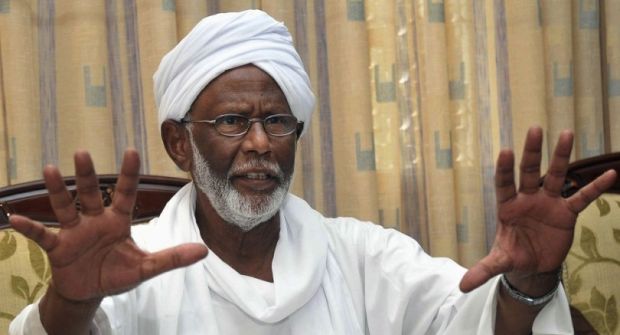
Leading Sudanese opposition figure Hassan Al-Turabi gestures during an interview in Khartoum on October 3, 2012. (Reuters)
Khartoum, Asharq Al-Awsat—Divisions within the Sudanese National Consensus Forces (NCF) opposition coalition have escalated amid an exchange of accusations between two of its largest parties, the National Ummah Party (NUP), led by Al-Sadiq Al-Mahdi, and the Popular Congress Party (PCP), led by Hassan Al-Turabi.
In the latest development, the PCP issued a statement denouncing accusations by the head of the political bureau of the NUP, Sarah Naqd, on Monday that Turabi planned and engineered the “Darfur tragedy,” which has claimed hundreds of thousands of lives since 2003. The PCP added that the accusations aimed to incite the security forces to arrest its leadership.
A PCP official said: “NUP accusations of Turabi being the engineer of the Darfur war follow the government and its security forces’ line of arresting and abusing our leaders.”
He added: “Such accusations are an insult to the people of Darfur, because it depicts them as simpletons who do not understand their issues, and therefore, needed Turabi to engineer it for them.”
Meanwhile, Kamal Omar, a lawyer and member of the PCP, said his party was the first to propose an initiative to resolve the Darfur crisis, and has not spared any effort to end the war. He accused the NUP of playing a negative role in the opposition and serving the government’s interests.
Speaking during a press conference on Monday, Omar said the NUP “supports the regime’s plans of creating conflict within the opposition coalition.”
The NUP threatened to walk out of the opposition coalition, announcing that a number of conditions must be met if it is to remain, including the overall restructuring of the coalition. However, NCF leaders rejected the conditions and granted the NUP the option to withdraw, with the opposition coalition remaining under the leadership of lawyer Farouk Abu Issa.
The other opposition parties accuse the leader of the NUP, Al-Sadiq Al-Mahdi, of seeking to become the overall leader of the coalition.
Omar said: “Al-Sadiq Al-Mahdi is seeking to secure the leadership of the NCF by calling for restructuring.”
Omar said his party was eager for the NUP to remain a member of the NCF, and that he held its leaders and supporters in high regard. He added that Al-Mahdi’s recent positions have embarrassed the opposition at a time when people are dissatisfied with the coalition’s performance, linking this to the appointment of Mahdi’s son, Abdelrahman, as a presidential aide.
For his part, Mahdi said he fears for the collapse of the state if the regime collapses, calling for regime change by consensus. He added that his son taking a government job was a personal choice, and did not represent the NCF.
The latest round of divisions within Sudan’s fractured opposition comes after the NUP accused Turabi of being the “engineer” of the violence in Darfur. The head of the political bureau of the party, Sarah Naqd, said: “The Darfur crime has touched all Sudanese people and was provoked by the regime in order to destroy the social fabric of the region,” adding that the “leader of the Islamists, Hassan Al-Turabi, is responsible for the crisis.”
